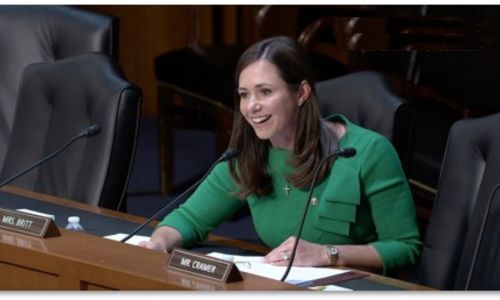Washington D.C. – Today, U.S. Senator Katie Britt (R-Ala.) reiterated the urgency of passing the Protect Our Bases Act, legislation she introduced with Senator Tim Scott (R-S.C.) to safeguard America’s military, intelligence, and national laboratory sites. Senator Britt’s renewed call comes after the Treasury Department proposed a rule to enhance the protections of the Committee on Foreign Investment in the United States (CFIUS).
“We cannot allow foreign adversaries to gain access to our sensitive military, intelligence, or national laboratory sites,” said Senator Britt. “It’s encouraging to see the Treasury Department take some of our advice from the Protect Our Bases Act, but America’s security demands more. It’s past time for Congress to pass this commonsense legislation that would prevent foreign adversaries from gaining access to critical intelligence that could jeopardize our national security and strategic interests.”
CFIUS is responsible for reviewing transactions involving foreign investments in the U.S. The newly proposed rule mandates CFIUS to scrutinize real estate transactions near military installations to prevent foreign adversaries from owning land in close proximity. In Alabama, this includes the Anniston Army Depot, Fort Novosel, Maxwell Air Force Base, and Redstone Arsenal. The rule reflects some of the language from the Protect Our Bases Act.
The Protect Our Bases Act would require CFIUS to review foreign land purchases near sensitive military, intelligence, and national laboratory sites. The legislation also mandates that CFIUS submit an annual, confidential report to Congress certifying the completion of such reviews and ensuring the accuracy of its real estate listings.
The importance of this legislation was highlighted in 2022 when the Fufeng Group, a Chinese company with ties to the Chinese Communist Party, attempted to purchase land near Grand Forks Air Force Base in North Dakota. CFIUS could not evaluate the transaction for national security risks because the Department of Defense had not listed the base as a sensitive site. Although the City of Grand Forks blocked the transaction, the incident exposed a significant flaw in the review process of foreign land purchases. CFIUS relies on its member agencies to provide updated information on sensitive sites to properly assess the security risk of foreign investments. Without accurate updates, CFIUS cannot ensure comprehensive reviews.
Senator Britt and her co-sponsors believe that the Protect Our Bases Act is crucial for closing these gaps and securing the nation’s critical sites from foreign adversaries.












